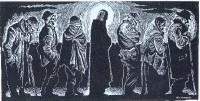

Karen House Catholic Worker
 |
Karen House Catholic Worker |
The RoundTable Thomas Merton Summer 1988 Major Articles
|
Download Entire Issue by Clicking Image Above (large file - it takes a minute!) |
|||
Karen House: 1840 Hogan St. Saint Louis, MO 63106 Contact Us: 314.621.4052 |
Regular Features
|
Why This Issue: In all of Thomas Merton's writings one thing consistently jumps out at the reader: the man was very human. In pictures where he stands at the door of his hermitage, facing the camera with his warm smile and inviting eyes, I imagine that shortly after the photo was snapped he probably tripped over a tree root or something; then, of course, laughed and made some wry comment. I have always sensed that he would be a very easy person to talk to. Judging from the numbers and variety of people who trekked up to Gethsemani to do just that, from Joan Baez to Jacques Maritain, it must have been a universal sentiment. And I admit, I don't swallow him whole. Sometimes I want to say to him. "Aw, come off it" when, for example, he would invite everyone up to see him and then complain that he had too many visitors. But that is exactly how we relate to our close friends: we don't idolize them, we know their strengths and their weaknesses, but most of all we love them.
Twenty years after his death in December, 1968, Thomas Merton is still a very loved man and a dear friend of the Catholic Worker. We love him because he wrote with such grace and vision about God's love for us, and human injustices, and how to live as a believer in our oppressively pagan culture. He also touched us with his honesty and humor about his own struggle to be a person of faith. Like a lot of us lost souls in the materially over-developed first world, Merton had to grope his way to God. He had his battle scars, his psychic wounds. Unlike a lot of us, he took what was common, our human frailty, and transformed it into communion.
We love him also because he set aside everything to follow Christ. There are some people who seek the truth about themselves and about life so single-mindedly that they can't jump through the conventional hoops or adopt the standard labels. Instead they end up in strange places doing unusual things. Dorothy Day in the bowery handing out bowls of soup and Thomas Merton in the secluded hills of Kentucky chanting the office were pursuing the same insistent call. The spirit blows where it wills and we never know where it's going or from where it comes.
In his article, Pat Coy compares the lives of Day and Merton, revealing the many parallels between them even though outwardly their faith took very different forms. Tom Nelson, C.M., relates Merton's thought on violence and war as the betrayal of our humanness. Mary Luke Tobin, S.L., reflects upon Merton's faith as the root of his politics and personal action, the center from which he spoke with a prophetic voice. We include a time-line of Merton’s life to illustrate his remarkable journey in faith, and a few of his poems. Following the house articles, Barb Prosser writes a fitting "Round Table Talk” reflecting on the struggle to remain true to the best in each other. Our foreign correspondent and much missed community member, Ann Manganaro offers a heart-wrenching report from El Salvador. In this issue, which marks the twentieth anniversary of Thomas Merton's death, we hope to allow him to touch you once again with his joy in our common humanity and his abiding faith in God.
-Ellen Rehg |
The RoundTable is 24 pages long. To download, you'll need the most recent version of Adobe Acrobat. Download Adobe Acrobat 8 here (it's easy AND free!)
Search all of the RoundTable issues for an author, subject or title here: |